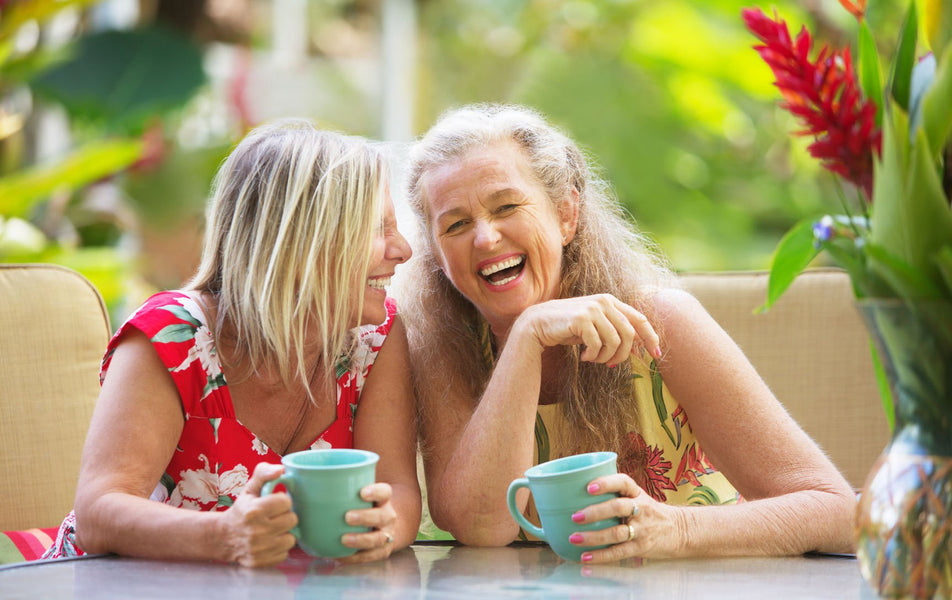
One afternoon recently I was feeling a little droopy and rundown when I bumped into a friend at our local shops. This particular friend radiates positivity and enthusiasm for life. As we hadn’t seen each other for a few weeks, we promised to schedule time to catch up properly soon, but as we parted ways I noticed a new spring in my step. After just five minutes of chatting with my friend, her boundless energy had rubbed off on me as if I’d taken caffeine pills or had 30 minute nap. I buzzed through my afternoon and carried renewed cheerfulness with me all evening.
The encounter was a powerful real-life demonstration of research I’ve been delving into recently which shows that people around us can have a profound impact on our health and well-being. It turns out, we can “catch” emotions expressed by our leaders, spouses, parents, siblings, colleagues, friends, and neighbours. For example, recent research found that being surrounded by friends with a healthy mood could halve the probability of developing depression and double the probability of recovering from depression. As I’ve written about previously, even checking updates from your friends on your social media feed can influence on your mood.
It’s not just emotions that may be contagious. Two of the leading researchers in this field are Nicholas Christakis from Yale University and James Fowler from the University of California, San Diego. In one study, they found that friends, and friends of friends, had similar levels of obesity. That is to say, if you have a friend who is obese, the chance that you are also obese increases by 45 percent. If a friend of a friend (two degrees of separation) is obese, your added risk of becoming obese is about 20 percent; and if a friend of a friend of a friend (three degrees) is obese, your risk is about 10 percent.
Unfortunately, this research doesn’t mean that you can blame any unwanted weight gain on your daughter’s best friend’s mother. Mathematical experts have questioned the statistical methodology on which Christakis and Fowler based their conclusions, believing that the evidence is weaker than what may have at first appeared. This debate though is not around whether or not peer influence exists, but rather around how powerful its effects. Researchers are now turning their attention towards how it can be used as a force for good. Social networks have been shown to be a powerful tool in getting people to make healthy changes including changing risky HIV behaviour, quitting smoking, exercising more and dieting.
While we still don’t fully understand exactly when, where, how, and why some things seem to catch on, we do have some clues. The people around us subtly influence what is socially acceptable. Our idea of an appropriate weight or an acceptable portion size might change when we compare our waistline to the waistlines of our friends or notice how much they eat. We also tend to gravitate toward people with whom we share things in common. For example, our friendships may be based on a mutual love of gourmet food, or taking time out to go for a cigarette break. Birds of a feather do indeed flock together.
When it comes to emotions, we tend to unconsciously mimic the facial expressions, voices, movements, and behaviours of people around us. Contagious behaviours, such as yawning, laughing, or crying, can be triggered by seeing, hearing, or even thinking of another person’s behaviour. We also have an innate ability to empathise with others. For example, by imagining ourselves in the position of someone who is experiencing depression we might take on some of those stressful and negative emotions as if they were our own.
All this brings a whole new level of meaning to the expression “You make me sick.” As Christakis and Fowler point out in their book, Connected: The Amazing Power of Social Networks and How They Shape Our Lives, “Our health depends on more than our own biology or even our own choices and actions. Our health also depends quite literally on the biology, choices, and actions of those around us.”
Since I’ve been reading about the fascinating science of social contagion, I’ve started noticing it in action in my daily life – The colleague at work who eats healthy vegetarian lunches and inspires me to do the same, the yoga-studio-owning friend who motivates me to stay committed to my practice every time I see him, the innate mindfulness my toddler-son brings with us on our walks in the morning, which I can’t help but “catch”.
As I left my positive friend in the shopping centre that afternoon, I took a moment to savour the uplifting effect she had on me. Her enthusiasm for life had changed the course of my afternoon, and that evening as I laughed and played with my husband and young boys, I knew that the mood had caught on.
*** If you want to know how susceptible you are to the emotions of others, check out the Emotional Contagion Scale, a measure used in this research to determine a person’s susceptibility to "catching" the emotions of others.





 My Year of Living Mindfully (DVD)
My Year of Living Mindfully (DVD) The Connection (DOWNLOAD-TO-OWN)
The Connection (DOWNLOAD-TO-OWN) My Year Of Living Mindfully - Book
My Year Of Living Mindfully - Book




